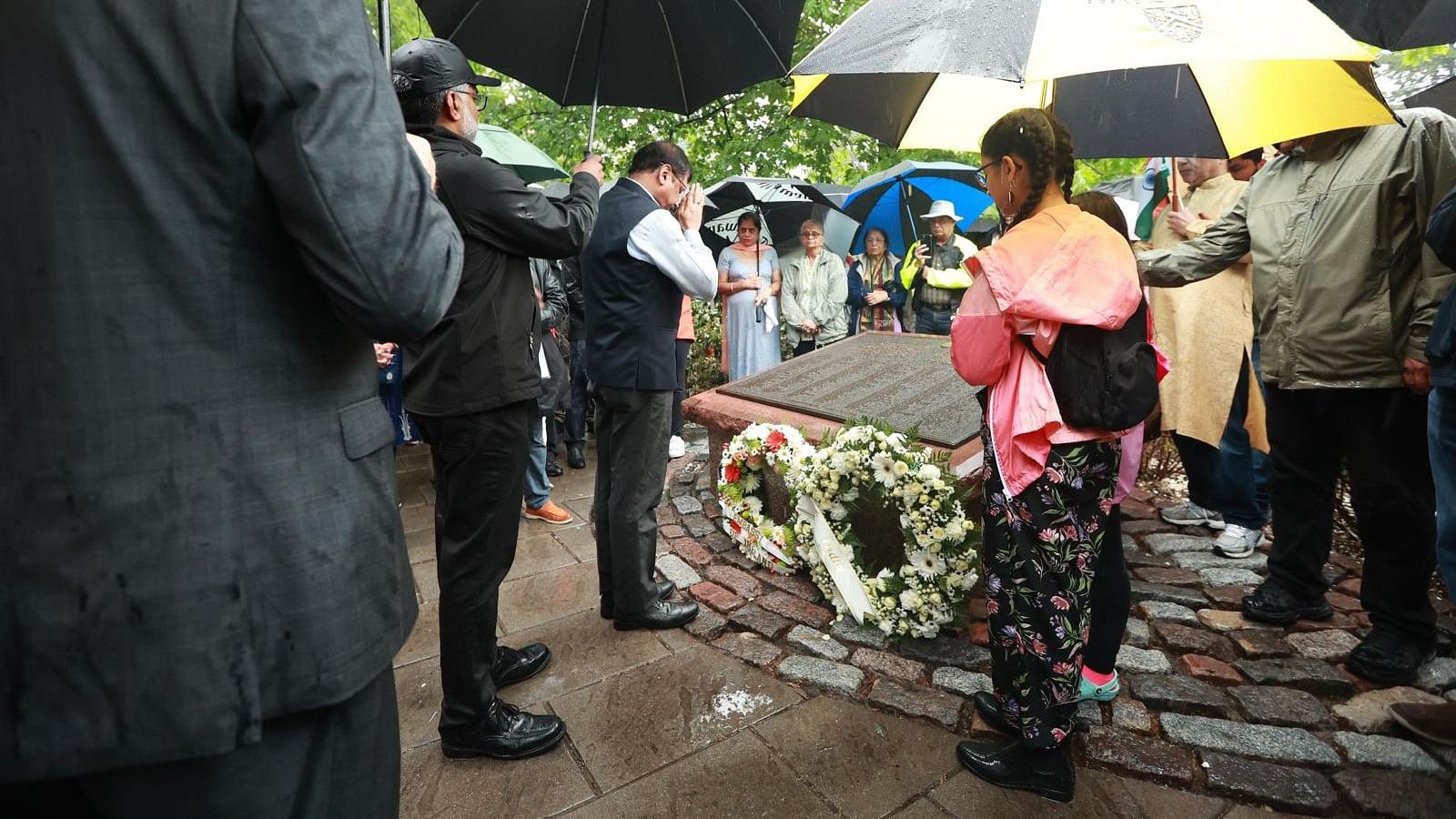
Indian High Commission members pay tribute to victims of the 1985 Kanishka bombing, June 23, 2024.
Credit: X/@HCI_Ottawa
New Delhi: Even as Prime Minister Justin Trudeau reaffirmed Canada’s determination to fight against violent extremism, India alleged that 'glorifying terrorism' had become 'routine' in the North American nation.
“We reaffirm Canada’s determination to fight against violent extremism and keep our people safe,” said Trudeau.
Meanwhile, New Delhi’s diplomatic mission in Ottawa and consular missions in Toronto and Vancouver held events on the occasion of the 39th anniversary of the 1985 bombing of Air India’s ‘Kanishka’ flight by the Khalistani terrorists on June 23. The solemn ceremonies paid homage to the 329 victims of the terrorist attack.
By holding events to pay homage to the 307 passengers and 22 members of the crew of the ill-fated aircraft, New Delhi’s missions in Canada sent out a subtle message to the government of the North American nation, where 'Sikhs for Justice' and other such separatist organisations continue to run a campaign for the secession of ‘Khalistan’ from India.
“Any act of glorifying terrorism, including the bombing of AI-182 in 1985, is deplorable and should be condemned by all peace-loving countries and people. It is unfortunate that such actions are allowed to be routine on many occasions in Canada,” the Embassy of India in Ottawa said in a statement issued on the occasion of the 39th anniversary of the bombing of the Air India aircraft.
Trudeau’s main political rival, Pierre Poilievre, the leader of the Conservative Party and the Opposition in the House of Commons, the lower chamber of Parliament of Canada also released a statement for the victims of the 1985 Air India flight bombing.
“As we honour the memory of the victims, Conservatives reaffirm our commitment to combating terrorism to prevent such unimaginable events from happening again,” said Poilievre.
Some Khalistani Sikh activists had turned up at a memorial ceremony held in Vancouver to pay homage to the victims of the terror attack. They waved the 'Khalistan' flag but expressed solidarity with the families of the victims. The people who had gathered to pay tribute to the bombing victims asked the Khalistani Sikh activists to go away.
India has been alleging that the Khalistani Sikh extremists had been given much political space in Canada.
The House of Commons – the lower chamber of the bicameral federal legislature of Canada – recently paid homage to Khalistani Sikh extremist, Hardeep Singh Nijjar, who had been killed in June 2023 in front of a gurdwara at Surrey in the British Columbia province of the North American nation.
Nijjar had been accused in several cases in India, including the ones involving murder, terrorist activities, and sedition. The Interpol had, in 2014 and 2016, issued Red Corner Notices against him on India’s request for his alleged role in killing six people in a blast at a cinema in Ludhiana in Punjab in 2007.
The US had also put him on the ‘No-Fly’ list in 2019. Canada had granted him citizenship in 2015. He had been heading the gurdwara at Surrey in the British Columbia province of Canada. He was shot dead in the parking lot of the gurdwara on June 18, 2023.
New Delhi’s relations with Ottawa nosedived after Trudeau on September 18 last year had told the House of Commons that his government’s security agencies had been actively pursuing the ‘credible allegations’ about ‘a potential link’ between the agents of the Government of India and the killing of Nijjar in Canada. New Delhi had dismissed Ottawa’s allegation, calling it ‘absurd’, ‘motivated’, and ‘unsubstantiated’.
Some Khalistani Sikh radicals on June 18 assembled in front of the Consulate General of India in Vancouver on the occasion of the first death anniversary of Nijjar. They held a mock trial for the killing of Nijjar, with an effigy of Modi dressed in prison stripes inside a makeshift cage and actors playing roles of a jury and a judge.
New Delhi conveyed its displeasure to Ottawa over the silence observed in the parliament of Canada as well as over the permission granted for holding the mock trial of the prime minister of India.
